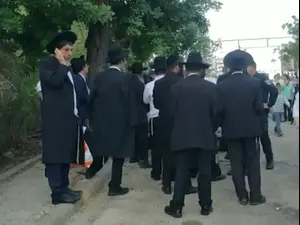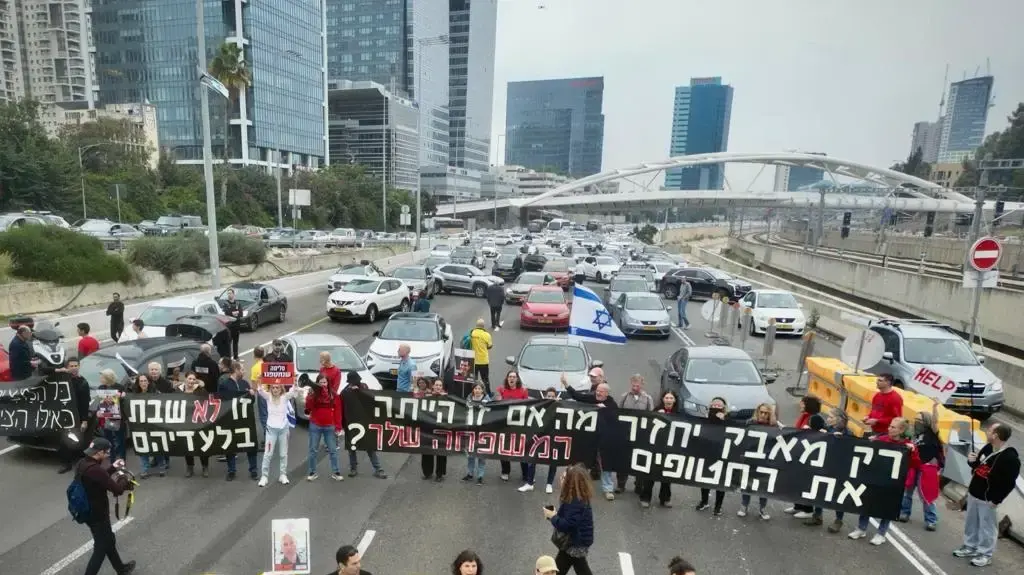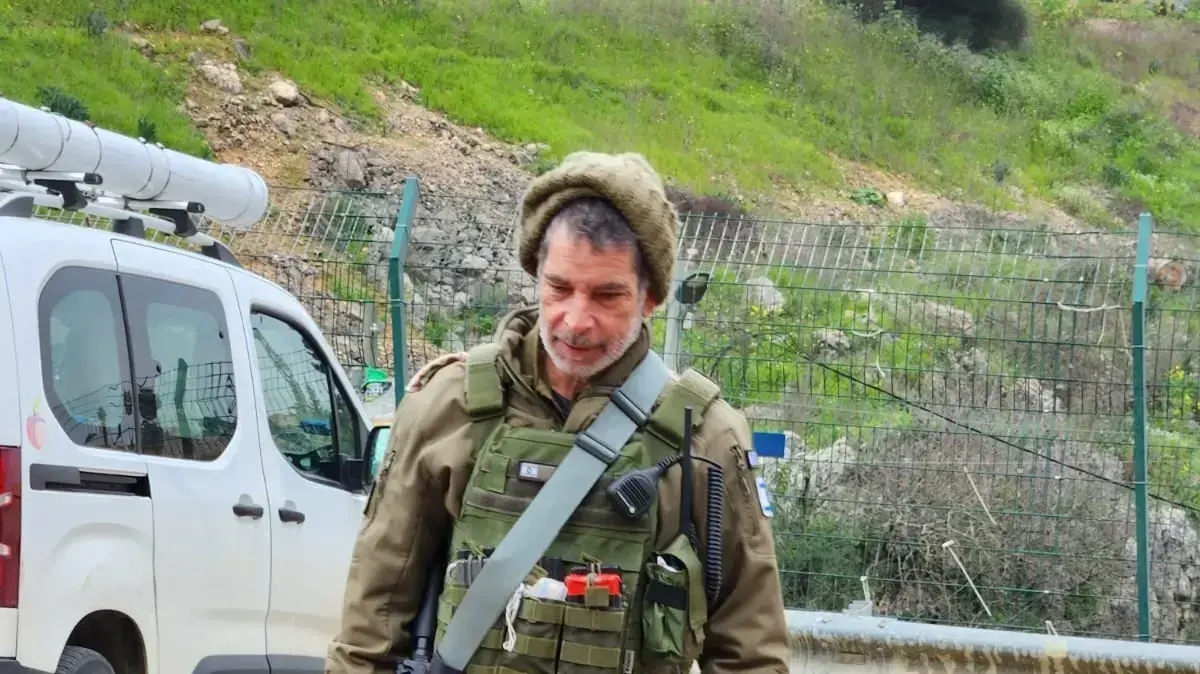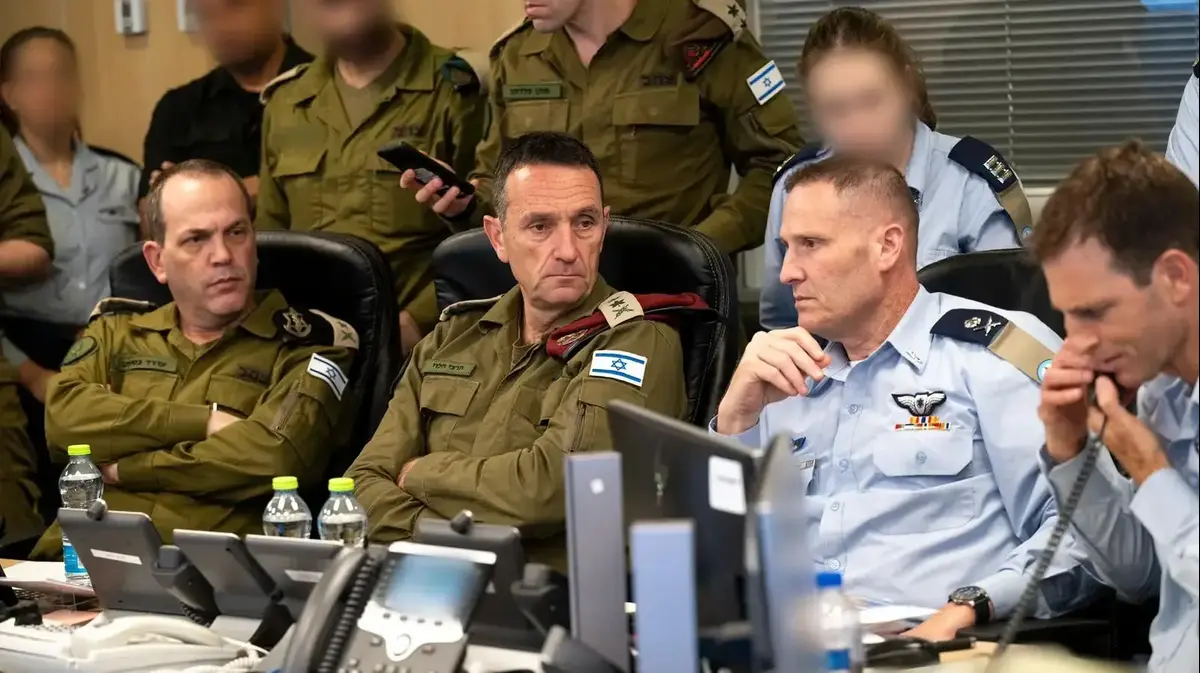news
Army and Security
"I realized that something big was going to happen": 15 years to the night of the Fajrim in the Second Lebanon War
At 4:00 a.m., fifty fighter jets took off from Air Force bases and lined up at attack buildings.
Target: Attack on Hezbollah's Fajr rocket array, before understanding the extent of the response to the abduction of reservists Ehud Goldwasser and Eldad Regev.
For the first time - an exclusive contact recording from that dramatic night
Tags
IDF
The Second Lebanon War
Hezbollah
Amir Bohbot
Friday, July 30, 2021, 11 p.m.
Share on Facebook
Share on WhatsApp
Share on general
Share on general
Share on Twitter
Share on Email
0 comments
Clashes in the West Bank: Palestinians throw stones at forces ...
An ultra-Orthodox event in Haifa
Riots in the Italian parliament during a debate on the presentation of ...
The third vaccination campaign began: "Want to feel free ...
A bird collides with a girl on a roller coaster
Caught her husband cheating - because of a ticking video
A buffet full of pizzas and burgers
Tips for a walk with the dog
Smoke billows after bombings in Daraa, Syria, July 2021
Dr. Elrai Price: We need to stop choosing tweezers countries ...
A mysterious UFO that is changing shape is stepping out of a plane window
Documentation: Locating a drug incubator in the Arava, landing from a helicopter and destroying ...
Contact Voices - Specific Weight (Contact Voices - Specific Weight)
July 12, 2006 began as another routine day of training flights in the "Valley Squadron" (109) at the Ramat David base. The time was 09:10. Squadron Commander Brigadier General Nir Barkan was on his way with the flight equipment to board the F-16, when he received a signal that Base Commander Brigadier General Rami Ben Ephraim was looking for him. "Rami was direct." I received a phone call from Gal Hirsch (Galilee Design Commander, AB). "Hannibal's code, a code for abduction, was used there," Brigadier General Barkan recalled the details of that conversation, while a great drama is taking place on the Lebanese border without the senior echelon of the IDF understanding its details and consequences - the Second Lebanon War was defined as a war only after it.
"I decide not to go on the training flight and stop those who have not yet left, return to the squadron, and give instructions to the technical wing: 'Please arm as many as you can four planes to attack.' I talk to the Air Force operations wing and hear the commotion. On alert - if necessary, we are ready. "
It later emerged that a Hezbollah force had entered Israeli territory, killed three soldiers, seriously wounded three, and abducted reservists Ehud Goldwasser and Eldad Regev.
More on Walla!
15 years to the second Lebanon: Hezbollah hoards 150,000 missiles, keeping them in a civilian environment
To the full article
More on Walla!
After 15 years: Hezbollah published documentation of the abduction of Regev and Goldwasser
Goldwasser and Regev's company commander recalls: "We lost contact, and announced the Hannibal procedure"
B-Cure Laser - Does It Really Help With Pain?
"Hear the commotion in the Air Force Operations Division" (Photo: IDF Spokesman)
Despite the missing details and uncertainty, Brigadier General Barkan takes the initiative and passes on his own an assault alert briefing under the responsibility of the IDF's northernmost combat squadron. His decisions save valuable time. "At the end of the briefing - a siren in the squadron. We run to the planes. On the way I see the last of the bombs coming to the fourth plane. Get on the plane. Take off. After a few minutes we are told 'get a target'. "I understand that something big is going to happen. Something else."
"Four buildings. This is different and unusual from what we have done since we left Lebanon in 2000. We get permission from the controller to attack. Attack quickly. Then we understand that in these buildings were the Knesset members who conducted the abduction."
Brigadier General Barkan then lands in the squadron, and understands that the IDF is preparing for a broad response.
"Upon landing, I hear my lieutenant take off and start getting targets. I discover in the squadron a completely different aggregation situation. I get over the connection to talk to the operations."
My second lieutenant answers me, updating him on the curfew of training flights, and the instruction received to arm all the planes from the headquarters.
"I see all the bombs on the way."
Stop training flights and change aggregation mode.
F-16 plane at Ramat David base (Photo: IDF Spokesman)
A few hours later, Defense Minister Amir Peretz convened a quite unusual in his office in the Halutz discussed the next steps, before evaluating the situation with security chiefs. Immediately afterwards they are supposed to present the resolutions Prime Minister Ehud Olmert and the security cabinet later.
Conversation , Which took place in a very tense atmosphere, Halutz recommended attacking Lebanon's national infrastructure. In retrospect, a correct decision was not made at first. The scope of the response that the IDF is cooking up in response to the abduction, and before it surprisingly activates the array to wreak havoc and kill civilians in the north.
"I see all the bombs on the way" (Photo: IDF Spokesman)
"specific gravity"
In those days Israel did not have the Iron Dome system and the home front was completely exposed, so the hundreds of rockets were perceived as one of Hezbollah's most powerful cards in the war against Israel. Nasrallah thought he had a secret plan, but the Israeli institution managed to crack it after years of ant work. Upon taking office, Peretz realized that Hezbollah had secretly managed to set up a Fajr rocket array, most of which was built in civilian homes in southern Lebanon and with mobile launchers hidden in commercial buildings.
It was a rocket made in Iran that reaches a range of 43 kilometers (as far as the northern cities including Tiberias), which rises to a height of five to six meters, and carries an explosive device weighing at least 45 kilograms. Within seconds, a barrage of six heavy rockets could be launched.
The IDF opposed the move. They claimed that it was too early in the fighting, and moreover they feared for the security of the intelligence sources and Mossad agents who worked to expose Hezbollah's plan. Peretz consulted with Mossad chief Meir Dagan - who gave the green light. Pioneer, "I want to go on the fajis - there will be no such thing in homes.
That is one of the biggest threats to the North. "
Ramat David soldiers prepare armament before attack (Photo: IDF Spokesman)
The IDF continued to make it difficult for the defense minister at the time, fearing that the attack would lead to civilian casualties, but the legal counsel of military attorney Avichai Mandblit gave permission for the neighborhood operation "specific weight.
" The mobile launchers from the hiding places, will bring them closer to the border to increase the range of lethality and will make it difficult for the IDF to locate them.
Peretz's plan of pressure was presented to Prime Minister Ehud Olmert and subsequently approved by the Security Cabinet.
The IDF prepared for the attack and began issuing orders to the area. Within a few hours, a special telegram arrived at the Valley Squadron.
Air Force soldiers prepare bombs before attack (Photo: IDF Spokesman)
Ramat David soldiers prepare armament before attack (Photo: IDF Spokesman)
Brigadier General Nir Barkan, currently Chief of Staff of the Air Force, holds the second most important position in the IDF, has served in the IDF for 35 years. Protector". He then served as head of an organizational branch at Air Force Headquarters. The Second Lebanon War broke out in the middle of his tenure as commander of the Valley Squadron.
"The transition from routine to emergency in the squadron was in no time," Barkan told Walla !, in an exclusive interview. "The program for years. We practiced a lot on it. It was clear to us that if it was a specific gravity it would not end in a day of fighting but most of it. It does not fly and end."
Barkan further explained that the plan underwent improvements and upgrades, especially thanks to the precise armaments that reached the Air Force, and helped the fighter pilots shorten the duration of the attack.
"Few people knew about the plan. We knew that there were valuable targets for the attack, and that this plan had a very large impact and was given great importance. But we did not know what they were. It was kept secret. It was also clear to us that if there was 'specific weight' State of Israel".
"The transition from routine to emergency in the squadron was in no time."
Nir Barkan (Photo: IDF Spokesman)
Operation Orders (Photo: Official Website, Walla!)
The head of the Operations Department in those days and now the commander of the Air Force, Major General Amikam Nurkin, delivered an updated operation order from the pit in Tel Aviv in the evening, which is revealed in this article for the first time. The scheduled time for the attack was around midnight. Dozens of planes, including eight F-16s from the Valley Squadron, will be headed by Brigadier General Barkan.
Barkan spoke about the way in which the people are chosen for such an operation. The squadron commander decides. Everyone really wants to. It's beautiful. I staff those who are qualified, practiced and trained recently. There are those who will tell you why not me? And it's people it's just fine. I prefer galloping horses. Everyone wants and prays to be on the staffing list on the board "(currently it is a list on the AB computer).
Takeoff was postponed several times and finally set for 4:00 p.m.
"My family, three children, lived in family housing at the base. I talk before takeoff with Liron, my wife, between and the Mets is postponed and I find time and we talk. What do I tell her? Talk. Everyone in the country knows what's going on. I say I stay in the squadron. "There is work and we will probably not see each other any time soon. We have not met for 33 days. She has taken full leadership of the family. Mental readiness at home? It is part of the preparations. You are preparing a family cell for the war. Today people understand that well," Barkan said.
Towards nightfall, a telegram arrives from the Air Force Commander, Major General Eliezer Shakedi.
"My almighty message was very important.
In short, he wrote that he trusted the people: 'Believe in you and get going.'"
A multi-barreled launcher that the Air Force attacked in Operation "Specific Weight" - exclusive to Walla!
(Photo: IDF Spokesman)
16 F-16 planes attack from Ramat David base (Photo: IDF Spokesman)
50 fighter jets from five squadrons took off from the corps bases and landed in air-raid structures, waiting for the moment of truth. "Night time. We settle in buildings, short intervals, each with its own goals and dozens of armaments, in a very short period of time, each one casts his armament. We have means of observation to see where the bombs fall. We practiced for many years on the model in Israeli territory but this "First time we do it in Lebanon. You sit in the cockpit quietly, and tell yourself it's just like I practiced. It looks very impressive. First time we experienced an operational flight of dozens of planes that drop a large amount of armaments at short intervals."
The Air Force attacked 42 targets in 23 minutes.
44 multi-barrel launchers including 35 stationary launchers and nine mobile on trucks.
"Somehow when you look at the Mets in Operation Wall Guard you understand where it was born from. Specific gravity is kind of his grandfather," Barkan said, adding, "When do I realize we attacked Fajr rockets? Only after landing. The hits were accurate. Very good results. The buildings and launchers were destroyed. For each purpose we dropped several bombs weighing a quarter of a ton to a ton. The intelligence was high quality and significant. The planning. The control. The treatment of the technicians on the ground. "It looked very light? So it was very unusual. Dozens of planes, very crowded, at night, short intervals between planes, seconds between each plane. The skill was high because we practiced for it."
An F-16 plane takes off from Ramat David for an attack as part of a specific gravity operation (Photo: IDF Spokesman)
The dimension of time was of great importance in carrying out the flights since Hezbollah could execute barrages of hundreds of Fajr rockets, so accuracy and speed were of paramount importance.
"Throughout the years we have trained to shrink the time between attacks," Barkan stressed. Know what minute not, second, he enters the lane and drops a bomb on the target. Think that all planes have to be synchronized like this. Everyone has a uniform clock so that everyone arrives on time. "You are defined as how long you can be above the target. Exactly. Hezbollah was definitely surprised. The country would have looked different if the Fajr night had not been carried out and was not successful. Unequivocally. We prevented falls and significant absorption."
"In the State of Israel, we understand this very quickly and the extent of the damage was broader," he adds.
"This is the melody played then by the Air Force Orchestra. Once I am a soloist and once a soloist. I always tell the pilots. Each of them must prepare and internalize that the moment will come in his shift that there will be war."
When Barkan was asked what the attacking suppliers would look like in the Third Lebanon War he smiled, pointing to the wall clock in the room, when he was just before an important discussion.
Share on Facebook
Share on WhatsApp
Share on general
Share on general
Share on Twitter
Share on Email
0 comments















